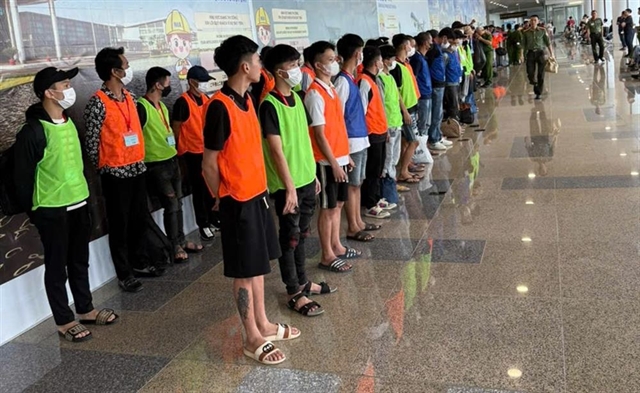 Society
Society

 |
| Nearly 100 suspects linked to the largest cybercrime ring uncovered this year were detained upon returning to Việt Nam. — Photo courtesy of the police |
HCM CITY — Vietnamese authorities have issued a nationwide alert over a surge in online scams, warning that cybercrime is becoming a serious and fast-growing threat across the country.
Addressing a recent anti-fraud awareness event, Colonel Nguyễn Huy Lục, head of the Cybersecurity and High-Tech Crime Prevention Department under the Ministry of Public Security, said online scams had become “more elaborate and harder to detect.”
Criminals are using increasingly sophisticated methods to defraud victims, including impersonating government officials, promoting fake investment platforms, issuing false service payment demands, and orchestrating romance scams, according to the colonel.
Police have identified several major scam tactics targeting Vietnamese citizens.
Fake police and government calls: Scammers impersonate police, prosecutors or court officials, accuse victims of serious crimes, and pressure them to transfer money or install fake apps that steal banking information.
“Help to recover lost money” scam: Fraudsters claim to be officials or lawyers offering to help victims reclaim previously lost funds. They use fake websites, documents and videos to gain trust, then demand additional payments, often defrauding the same person twice.
Fake investment platforms: posing as representatives from crypto or financial trading platforms, scammers promise high returns and show early profits to gain trust. Victims typically lose large sums once the platforms vanish.
Online romance scams: Criminals create fake profiles on social media or dating apps to build emotional relationships, then persuade victims to invest in fraudulent apps or gambling sites before disappearing with the money.
Service payment scams: Scammers impersonate electricity, telecom, or water companies, threatening service cut-offs unless immediate payments are made. Victims are sometimes tricked into downloading apps that steal sensitive information.
Fake scholarships and school calls: Victims are contacted about fake scholarship offers or tuition refunds. Scammers demand deposits or banking details, often through phishing links.
Online shopping and travel scams: Fraudulent websites advertise cheap products or travel packages to lure deposits, then vanish without delivering the goods or services.
In response, the ministry is ramping up efforts to fight cybercrime, including updating laws, tightening supervision of internet and telecom services, and deploying new digital tools to identify and stop scams quickly.
Over 500 million warning SMS messages have been sent to the public, and the ministry is working closely with global tech companies to expand outreach and public education.
Police have also dismantled several major scam networks, including a transnational fraud ring operating out of the Golden Triangle, the border region of Thailand, Laos, and Myanmar, long known as a hub for drug trafficking, organised crime, and now a hotspot for cybercrime, with scam call centres targeting victims across Southeast Asia.
Many Vietnamese citizens have been tricked into travelling to the region with fake job offers, only to be forced to work under exploitative or coercive conditions.
Most notably, police in the central province of Nghệ An recently busted what is considered to be the largest cybercrime network uncovered so far this year.
The transnational fraud ring, operating in Myanmar and the Philippines, is suspected of defrauding Vietnamese victims of more than VNĐ2 trillion (US$76.58 million). Nearly 100 suspects were arrested in the operation.
Authorities are urging the public to stay alert, avoid clicking on suspicious links, and never transfer money without thoroughly verifying the source. — VNS